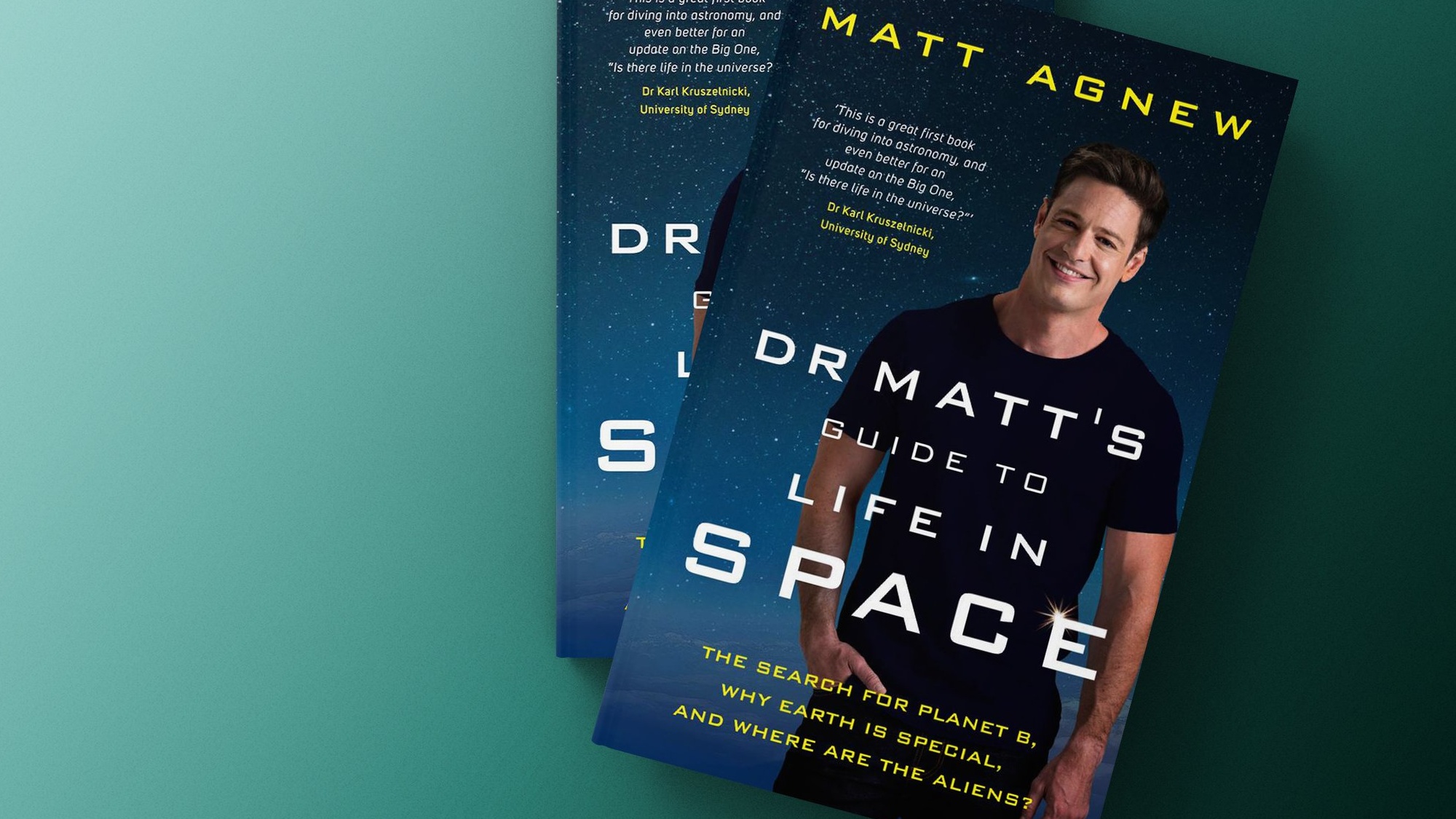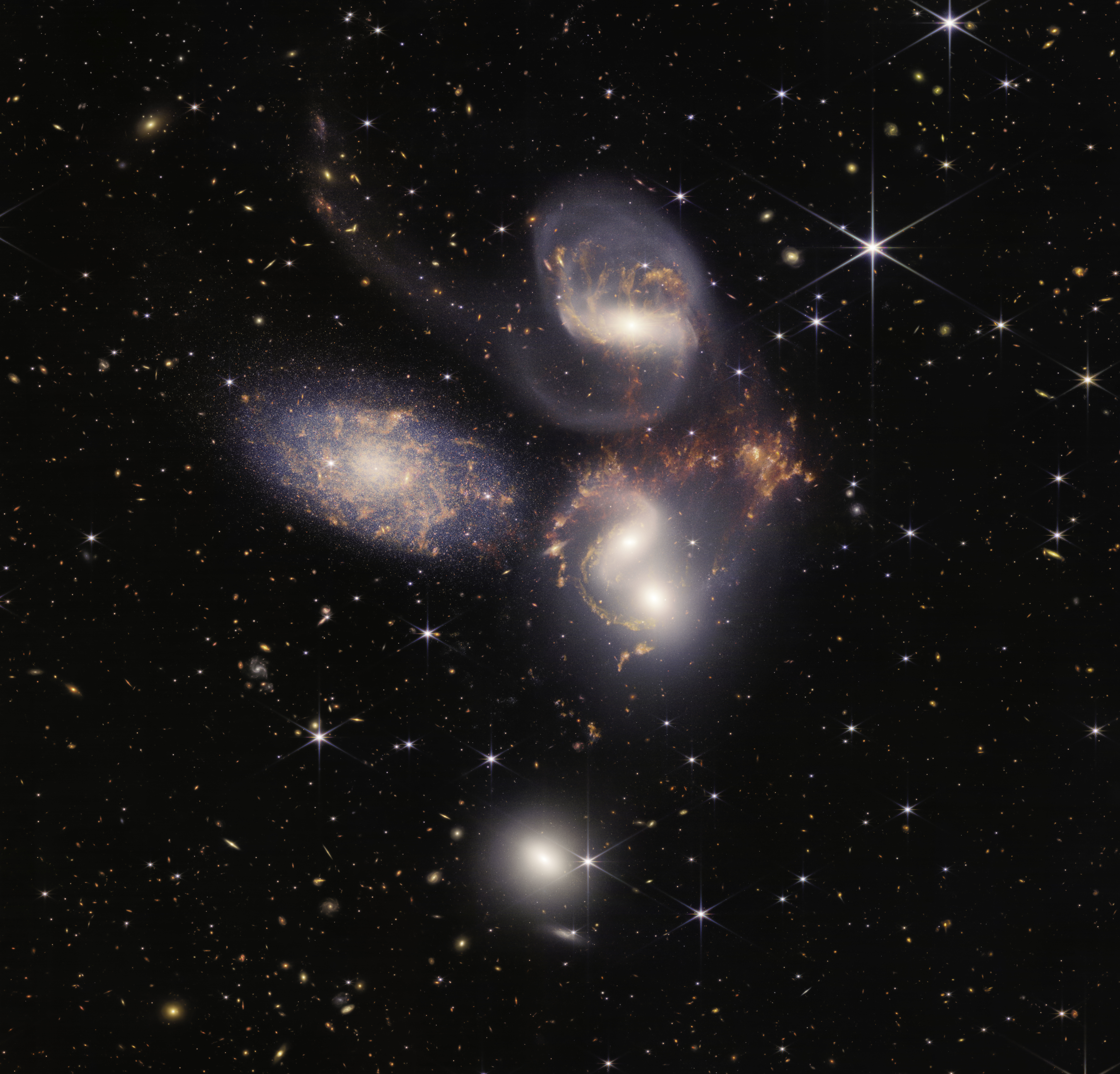News feed

You might recognise Matt Agnew as the affable, easy-going space-nerd from season seven of Australian reality TV show, The Bachelor. Off-screen, the 35-year-old has been incredibly busy working on projects that excite him most, like space.
It doesn’t take a rocket scientist to figure out that Agnew is completely obsessed with astronomy and the exploration of the world beyond Earth. It’s been a curiosity and fascination he’s nurtured since he was a child, and one that he has turned into a career as an astrophysicist.
But now, Agnew is offering his passion and expertise to anyone looking to learn about space exploration is an easy-to-digest manner. Dr. Matt’s Guide to Life in Space is the first book from Agnew, who explores the qualities that make planet Earth special, poses the question of what is beyond our solar system, and even delves into the popular question of whether aliens really do exist.
Agnew’s imagination runs wild in his first book, and we were fortunate enough to catch up with the expert to learn all about the universe and beyond.
Dr. Matt’s Guide to Life in Space IS OUT NOW
Grazia: Hi Matt! Congratulations on your first book, Dr. Matt’s Guide to Life in Space. What made you want to sit down and put together your first book? Was it something that was always on the cards?
Matt Agnew: Thanks for the kind words! Yeah, I’ve always had an interest in science communications; I worked as a private tutor for about ten years back in my undergrad days and then during my PhD, I also taught some tutorial and lab classes. Something I’ve always enjoyed seeing is that sort of “aha” or “light bulb” moment that students get when something suddenly makes sense and clicks for them. Back in 2017-2018, I also started doing public lectures and you see a similar kind of response where something kind of clicks for the audience and they get enamoured with this really cool, interesting idea or concept that has probably tickled a little bit of childlike curiosity.
The opportunity to write a book was definitely something I was always keen to do in terms of scientific outreach and communication. But the format of writing a book itself wasn’t something that was always on my mind. It felt a bit more aspirational than realistic. So I was thrilled with the fact that I got to do it.
Grazia: Can you talk to us about the process of researching and ultimately putting together this book? Did it come easy? Broadly speaking, space is a comprehensive topic so it must have taken you quite some time…
MA: It was definitely a challenging experience. The book itself is broken up into three parts: part one is all about why the earth is special. Part two is about where else is special, both within our own solar system and beyond planetary systems around other stars. And part three is about the aliens. Part two was very much within my kind of research focus that I did my PhD on; I was very familiar with the body of research that pertained to that particular area. Part one I was aware of, but for something like this, obviously I wanted to make sure it was rock solid in terms of the scientific journal articles and what the current state of the research was with regards to certain things like planetary, habitability, the origins of life, what’s the current leading belief.
So that was something that I think everyone has some ideas about. But actually digging deeper into the research itself was certainly entertaining. Obviously there was a lot of time commitment in terms of going through the scientific journal articles themselves, which can be very heavy and technical and jargon heavy. But it was all enjoyable and all stuff that I am very interested in.
Grazia: There have been some great reviews from critics that all reiterate how you make what can be a difficult topic to understand, understandable. Was the intention to make this a topic that’s relatable and easy to digest for people of all ages?
MA: Yeah, absolutely. One of the key goals I wanted to achieve was to make it really accessible to everyone. Part of that, and a key skill of effective science communication, is teaching something that can be very complex and complicated and being able to distill it down into something that anyone can engage in and access and understand. It’s really important that it’s not dumbed-down information. As I like to say, it’s a case of ‘trimming the fat’ and trying to get it down so you haven’t lost the core concepts of what something is about. It takes lot of practice and it’s something I’ve really made a concerted effort to develop over the years. I also heavily rely on analogies because it’s often the easiest way to communicate abstract ideas; things that are really hard to get your head around.
Grazia: Where and when did your love for astronomy begin? Can you pinpoint a moment, maybe as a child, that you said to yourself, ‘I’d love to focus on this for the rest of my life’.
MA: Yeah, absolutely. I think everyone goes through that space phase as a kid, right? After the dinosaur phase, before the robot phase, I think space is right in there.
“I think I was in year four [at school] and I had to do a research project. I had no idea what to do and my mum suggested I do something on NASA’s Pathfinder mission.”
That was the mission to put NASA’s first rover on Mars. I didn’t know anything about it, but it just so happened there was a two-page spread in the newspaper, and I had pictures of the rover I had pictures of the spacecraft, I had images of the planet surface that had been beamed back. And I remember just being completely engrossed by the fact that there was literally a robot on another planet taking pictures. That was definitely a moment I fell in love with space beyond a childlike curiosity.
Grazia: You undoubtedly get this question all the time but it’s understandably one many ponder: do you think there is life out there beyond earth?
MA: I definitely subscribe to the idea that there is life out there. I wouldn’t say it’s common, but it’s not uncommon in the sense that it’s probably very simple, very microbial bacterial cellular. But I do think it would be a case of, if you have the right environment and all the right ingredients, then life does spontaneously begin in terms of it evolving further into much more complex life and certainly evolving into intelligent life. I think that’s where there’s a really, really fundamental and difficult jump that needs to be made. Sure, a lot of this is just what my gut tells me.
Grazia: Do you share the same optimism towards the idea of ‘Planet B’?
MA: Yeah, certainly. With the latest launch of technology like the James Webb Space Telescope and the Hubble Space Telescope, the fidelity of the images and the spectroscopy that they can do to identify the chemical components in atmospheres around very small planets is going to help us identify planets that might be of similar size. We’ll even be able to see if the atmosphere is breathable which is even more exciting. So we might discover a Planet B. The additional challenge is then how to actually get tens of light years away and sometimes up to a hundred light years away. We have no way to even get to our nearest stars which are four light years away. The furthest spacecraft we launched was 40 years ago and that’s almost one light day away.
“Could we discover a planet like Earth? Certainly. Could we get there? Definitely not in the foreseeable future, so we need to look after the planet we have now.”

Grazia: Away from astronomy, the Bachelor was obviously a big milestone for you. How’s life been since your time on the show? Has life changed for you in a drastic way?
MA: The biggest change for me was being thrust into the public spotlight. I had a very, very private life prior to that and that all changed in the space of three months quite substantially. It’s been hard. Obviously going through a breakup is very hard, but having to go through one in public adds another layer of challenge – everyone has their opinions and criticisms and navigating that was quite challenging. But beyond that, I see it as one part didn’t quite work out, but I’ve also been blessed now with a platform that I can use for things that I’m really passionate about. I’ve tried to be involved in conversations and discourse around feminism and gender equality and tried to obviously weigh in around the vaccinations during the pandemic. I hope I can continue using it in a really positive and productive way.
Grazia: And lastly, how’s 2023 shaping up? What can we expect to see from you?
MA: 2023 is looking pretty good. I definitely have a few irons in the fire. I’m hoping to continue on with the book tour, which I had to reschedule due to illness. I am currently writing a second book, and hopefully that will hit the shelves at the end of next year. There are also a few other things in the pipeline as well that hopefully will come to fruition in the first half of next year… watch this space!
Dr. Matt’s Guide to Life in Space IS OUT NOW









